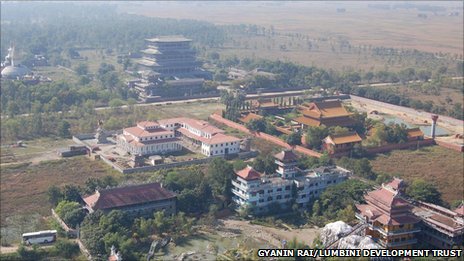
The BBC has an article today that asks: “What happened to the dream of a Buddhist Mecca?” The article is about development in Lumbini, Nepal, the birthplace of the Buddha. It’s a common question these days (in fact, I wrote the same article more or less in The Oregonian over two years ago), as the project has been in the works for decades. What started as a beautiful dream by U Thant, then secretary-general of the United Nations, who wanted to revive Lumbini after seeing the site’s condition in 1967, is now a slog of finger pointing by those in charge of the redevelopment process. People closest to the project believe that money is at the heart of the problem. If that’s true, then Lumbini’s troubles might be over. A Chinese group called the Asia Pacific Exchange and Co-operation Foundation, says that it will raise $3 billion to develop the sacred Buddhist site.
It should also be pointed out, however, that even with all the money in the world Lumbini will never be a “Buddhist Mecca” because pilgrimage isn’t as central to the Buddhist tradition as it is in Islam. A pilgrimage to Mecca (haji) is one of the Five Pillars of Islam, which are the basic acts that all devout Muslims are expected to perform. If pilgrimage held such a lofty position in the Buddhist tradition, this would be akin to finding it mentioned in the Four Noble Truths or outlined as a part of the Eightfold Path.
Of course, none of this means that Lumbini should not be developed. Even though pilgrimage isn’t as central to Buddhism as it is to Islam, Buddhists have been embarking on trips to sacred sites for centuries and pilgrimage is mentioned in Buddhist literature. In the Mahaparinirvana Sutta the Buddha says, “Lumbini is where the Tathagata [Buddha] was born, this is a place which should be seen by a person of devotion, and which would cause awareness and apprehension of the nature of impermanence.”
Indeed, there are many reasons to develop the Buddha’s birthplace (see videos on the matter here and here). But it’s unrealistic think that Lumbini will ever be a Buddhist Mecca. The sooner people let go of that idea the sooner they might see some progress toward a more reachable goal.
Thank you for subscribing to Tricycle! As a nonprofit, we depend on readers like you to keep Buddhist teachings and practices widely available.